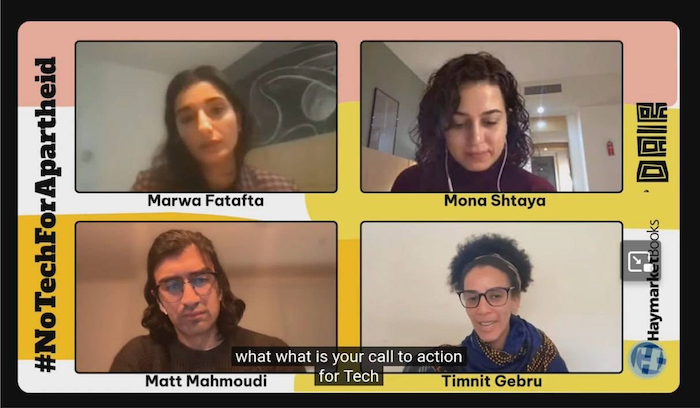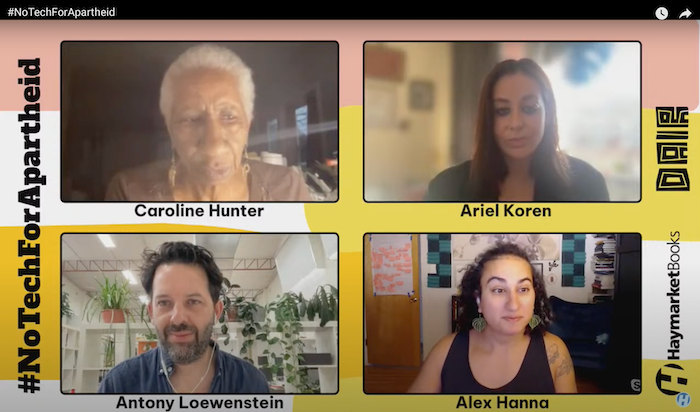#NoTechForApartheid
Thank you to our participants and audience who joined us for our #NoTechForApartheid event co-hosted with Haymarketbooks. If you missed the event, you can find the recording here. We learned a lot, and we are certain that you will too.

We kicked off the first panel with our panelists Mona Shtaya, Marwa Fatafta and Matt Mahmoudi outlining the legal definition of apartheid and going into detail to describe how Palestinians are controlled and fragmented by Israeli apartheid. For example, Marwa detailed how Palestinians living in the West Bank cannot move freely without going through check points, while this does not apply to Jewish settlers there.
After describing the apartheid reality, our panelists elaborated on how this apartheid is enabled through technology, and what tech workers can do to resist it. We discussed three aspects of technology even though there are many more: social media platforms, internet shutdowns, and face recognition systems.
Mona described the manner in which social media platforms systematically silence and dehumanize Palestinian voices. She explained how social media content moderation practices simultaneously censure any information pertaining to Palestinians, while allowing disinformation and dehumanization of Palestinians to spread. She herself was shadowbanned by Instagram after posting an analysis that called out algorithmic and content moderation bias against Palestinians.
Marwa described how internet shutdowns and deliberate targeting of information and communications technology (ICT) infrastructure by Israeli bombing isolate Palestinians. As just one example, she told us that many Palestinian families decide to live separately so that their entire bloodlines are not wiped out. The destruction of communications infrastructure makes it difficult for these family members to connect with each other and the outside world. Some of these points are discussed in an Access Now report she co-authored.
Matt elaborated on the Amnesty international report he worked on titled Israel and Occupied Palestinian Territories: Automated Apartheid: How facial recognition fragments, segregates and controls Palestinians in the OPT, and described the level to which face recognition systems are used to surveil Palestinians. To give an example of how dehumanized Palestinians are, he noted that Israeli soldiers are rewarded for the number of Palestinians they add to face recognition databases, with people getting days off or bonuses if they are in the unit that adds the most number of Palestinian faces.
Our panelists called on tech workers to not only advocate for responsible uses of technology, but also advocate for #NoTechForApartheid. Matt noted that technology is only developed through the labor of tech workers, and we can all withhold our labor. Marwa reminded us that Palestine is the canary in the coal mine. If you are quiet because you think the issue is too “radioactive,” rest assured that it will come to you. Similarly, Mona reminded us that tech worker activism from inside “in all its forms like speaking up, leaks, petitions” is important, and she closed by giving a shout out to those engaged in this activism, urging them to “keep it up”.

Our second panel kicked off with Antony Loewenstein elaborating on the technology developed through experimentation on Palestinians and exported around the world. He noted that even countries critical of Israel want to get their hands on their weapons and spyware technology, an observation thrown into stark relief with the summary "the Abraham accords were an arms deal." Crucially, Antony noted that Israel not only treats Palestine as a laboratory, as he writes in his book, The Palestine Laboratory: How Israel Exports the Technology of Occupation Around the World, but it also does this with impunity.
Caroline Hunter, co-founder of the Polaroid Revolutionary Workers Movement launched in 1970, walked us through her journey to anti-apartheid activism and starting the divestment movement against apartheid South Africa in the US. She was born and raised in segregated New Orleans, graduated high school in the 60s, and made her way to Polaroid after college. Polaroid was not unionized, and had tactics to intimidate workers, like hiring your relatives so that they can use that against you if anything came up. In spite of the risks, Caroline and her peers presented Polaroid with 3 demands, including that Polaroid denounce apartheid in the US and South Africa, and that Polaroid divest from South Africa. The company retaliated against these workers, but eventually, the boycott campaign worked!
Just like Caroline was retaliated against by Polaroid, Ariel Koren was pushed out of Google in 2022 for organizing on behalf of the #NoTechForApartheid and Drop Nimbus campaigns. Describing Project Nimbus, she explains: "Google is providing powerful cloud services to the Israeli government and military that are violating human rights on a regular basis.” The contract even stipulates that the company can’t pull out in response to outside pressure.
Ariel outlined the manner in which Google weaponizes its Diversity Equity and Inclusion (DEI) initiatives, detailing how employee resource groups were used against her and her peers. For example, the group Jewglers, while ostensibly representing Jews like her at Google, represented Zionist interests instead. In the 2020 Black Lives Matter uprisings, Jewgler representatives complained about Google’s donations to the Movement for Black Lives, resulting in Google apologizing and donating to organizations like Friends of Israel Defense Forces (IDF).
To close, our panelists stressed that tech workers have a huge role to play. Antony mentioned how egregious claims that AI is enabling “humane warfare,” and that AI is being used to save Palestinian lives, are. He stressed that the US military industrial complex is greatly expanding, and reminded us that there are weapons companies battle testing weapons in Gaza right now. He called on us to highlight weapons companies like Elbit Systems involved in Israeli apartheid.
Caroline reminded us that it is important to educate the public and that "boycotts are an educational campaign.” This struggle is not just about Palestinians–"the tech used on them is exported elsewhere, just like the Polaroid ID used in South Africa was also used in Vietnam, and carried into other conflicts."
Ariel reiterated the call to tech workers for a targeted campaign against Google and Amazon's Project Nimbus. She shared with us that a Palestinian Google intern named Mai R. Ubeid was killed by Israeli air strikes. Google has yet to issue a statement on her killing. Ariel wrote: "Amidst the cruel silence from company leadership, workers have committed to growing louder in their opposition to Project Nimbus and to continuing to honor Mai's legacy."
Ariel ended with a mass call for tech workers which was announced on Tuesday November 28. If you are a tech worker, go to notechforapartheid.com to learn about the #NoTechForApartheid movement, and email notech4apartheid@protonmail.com to get involved. If you work at Google or Amazon you can fill out bit.ly/NotaGoogleIntake or bit.ly/NotaAmazonIntake to join the movement.
We thank all of the speakers for this incredibly rich, grounded and inspiring discussion. These notes only scratch the surface of what was covered. Readers are encouraged to watch the full recording.